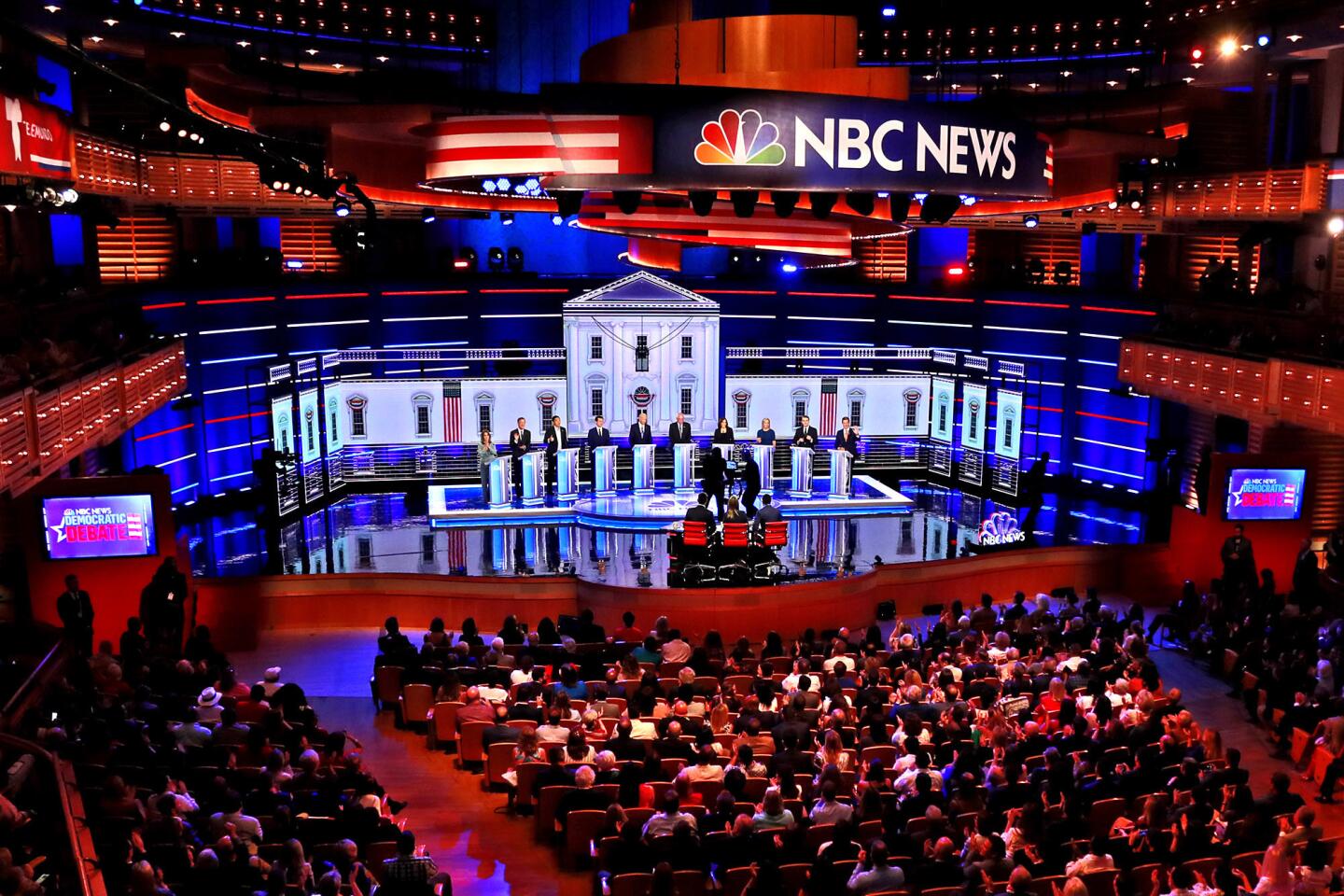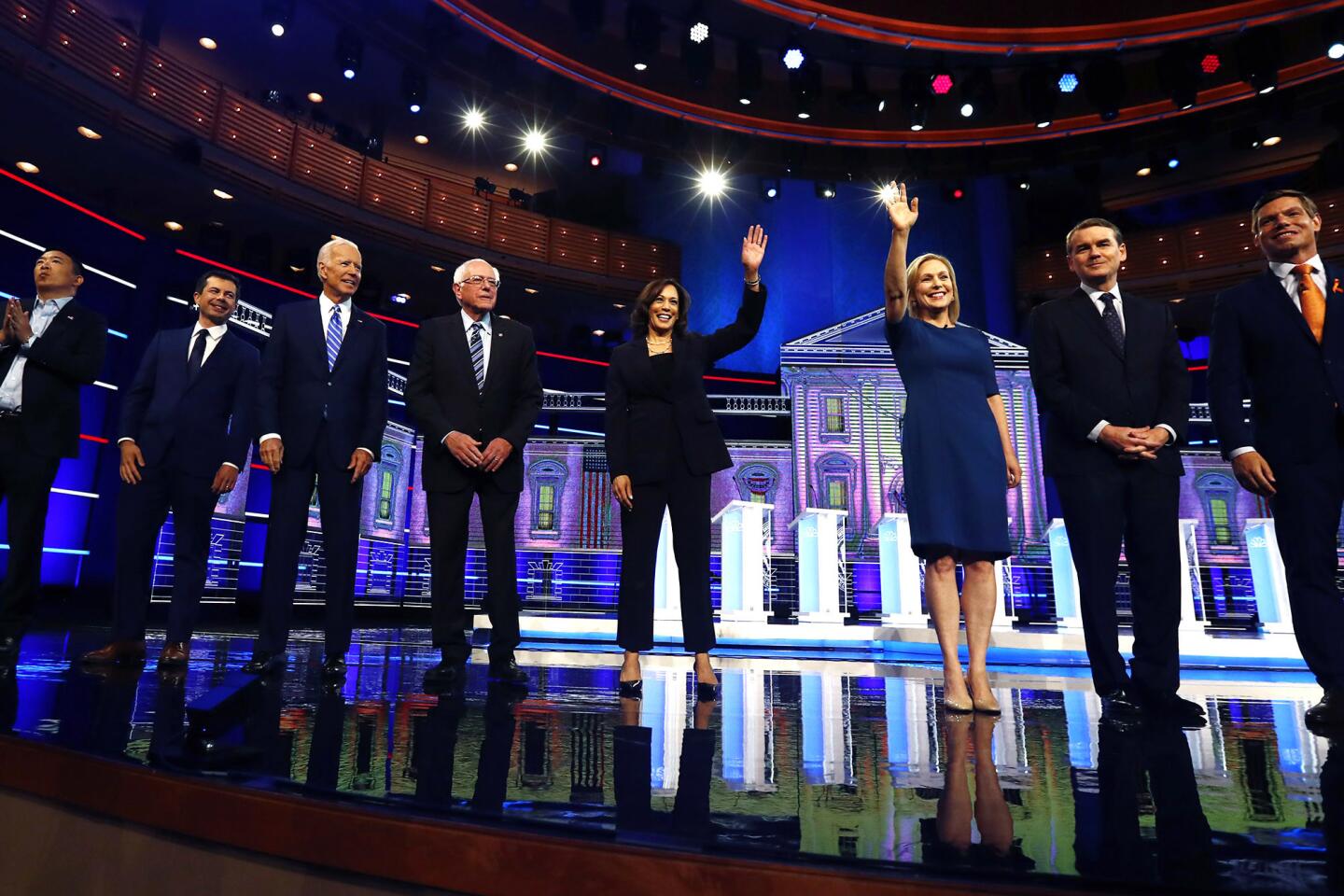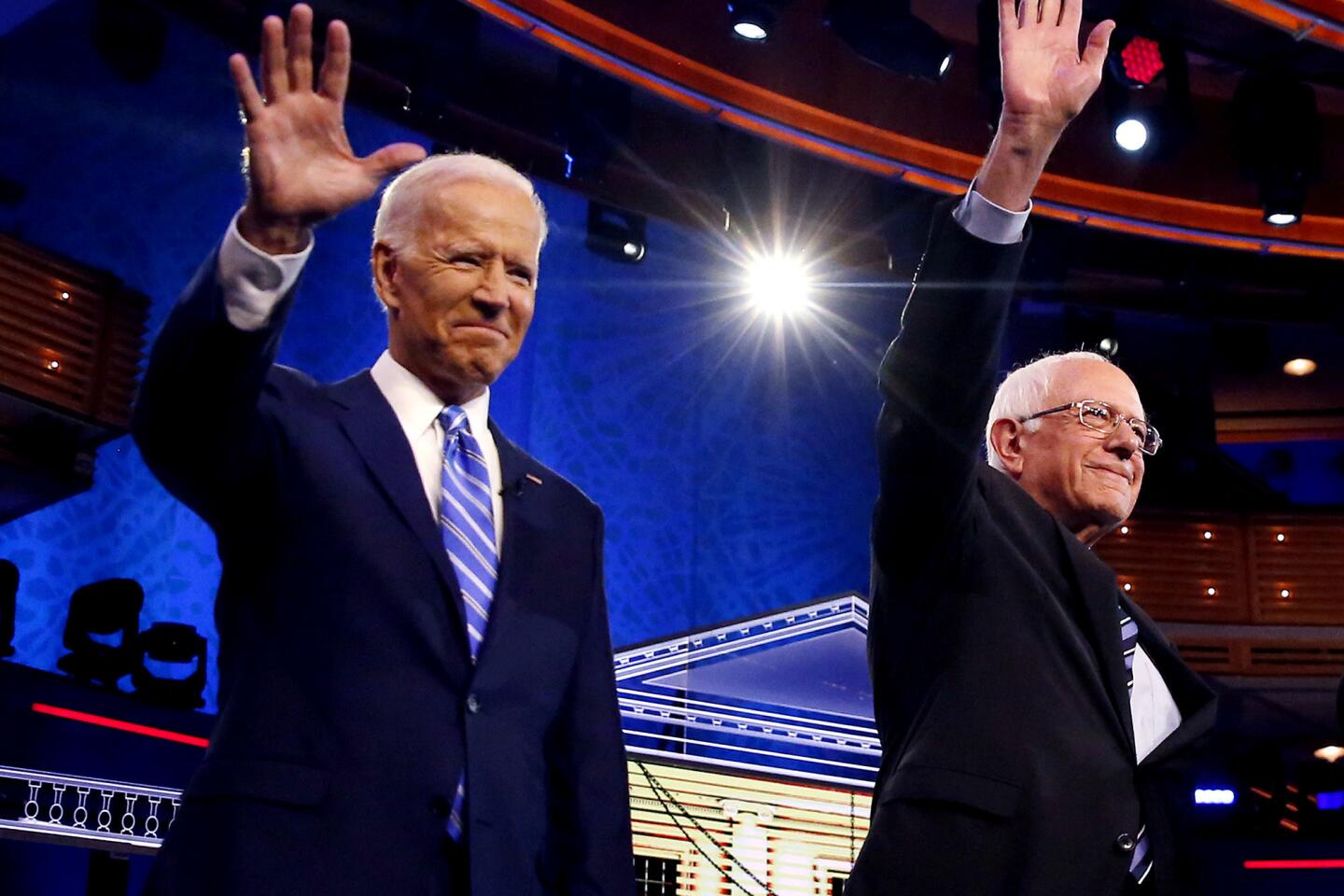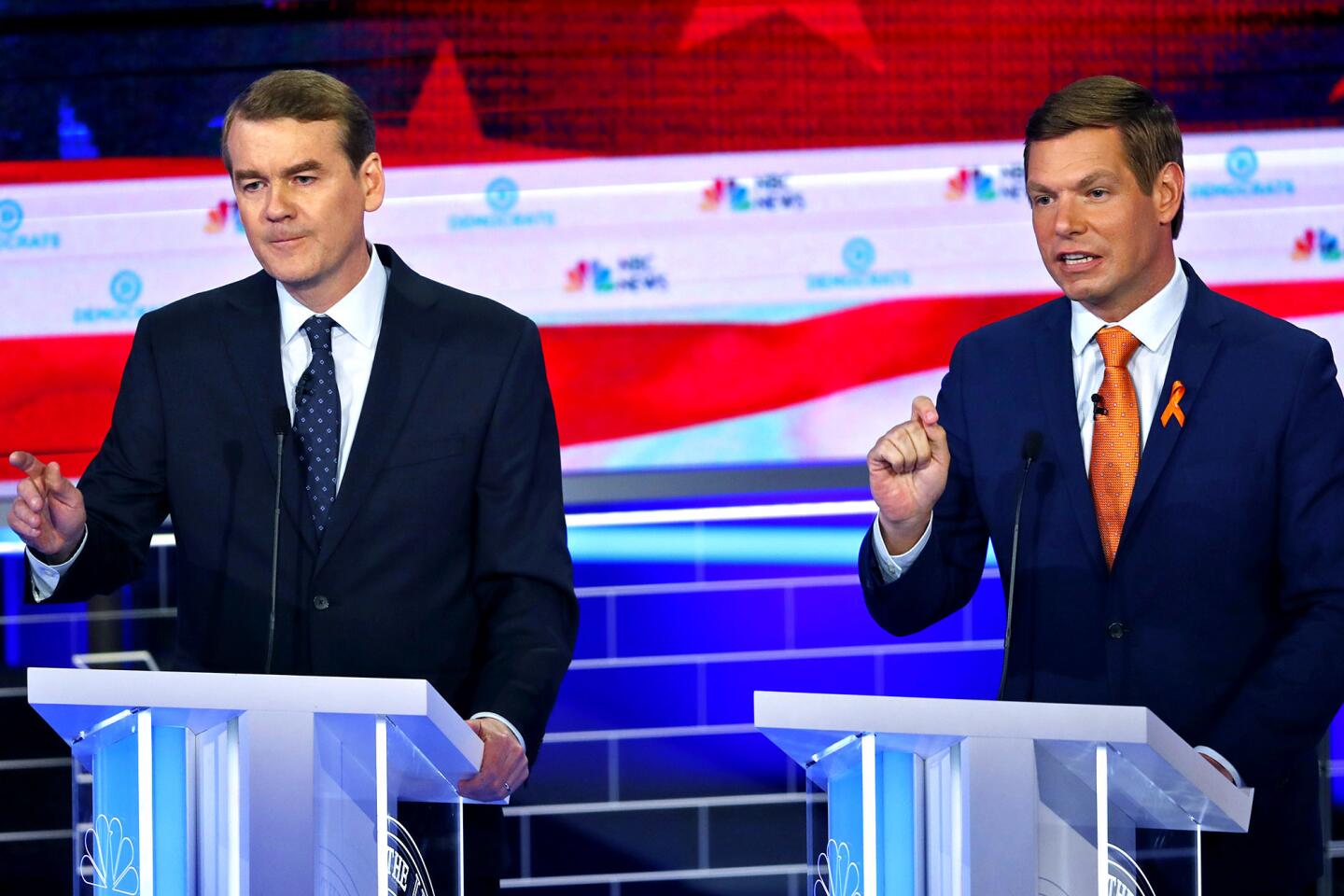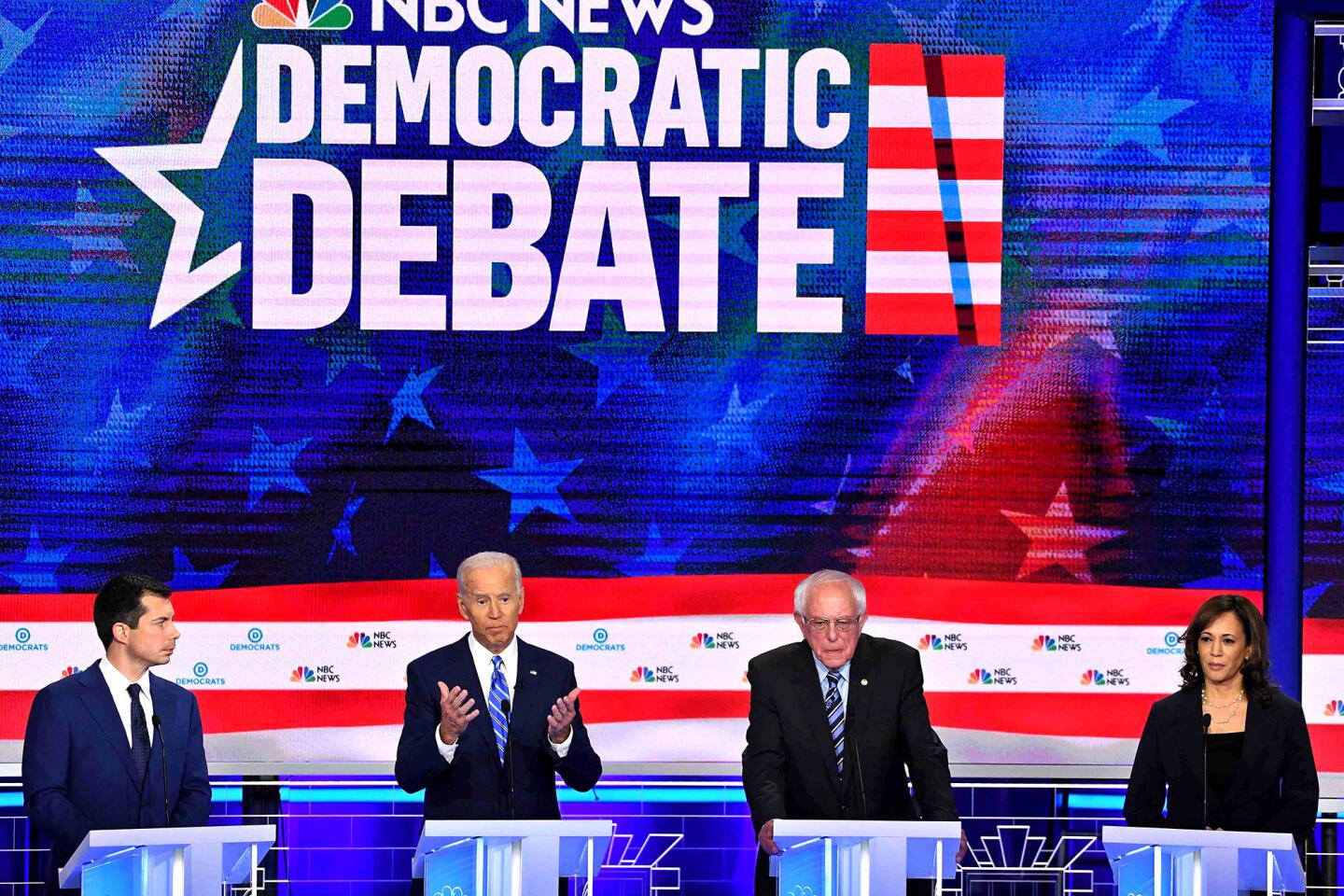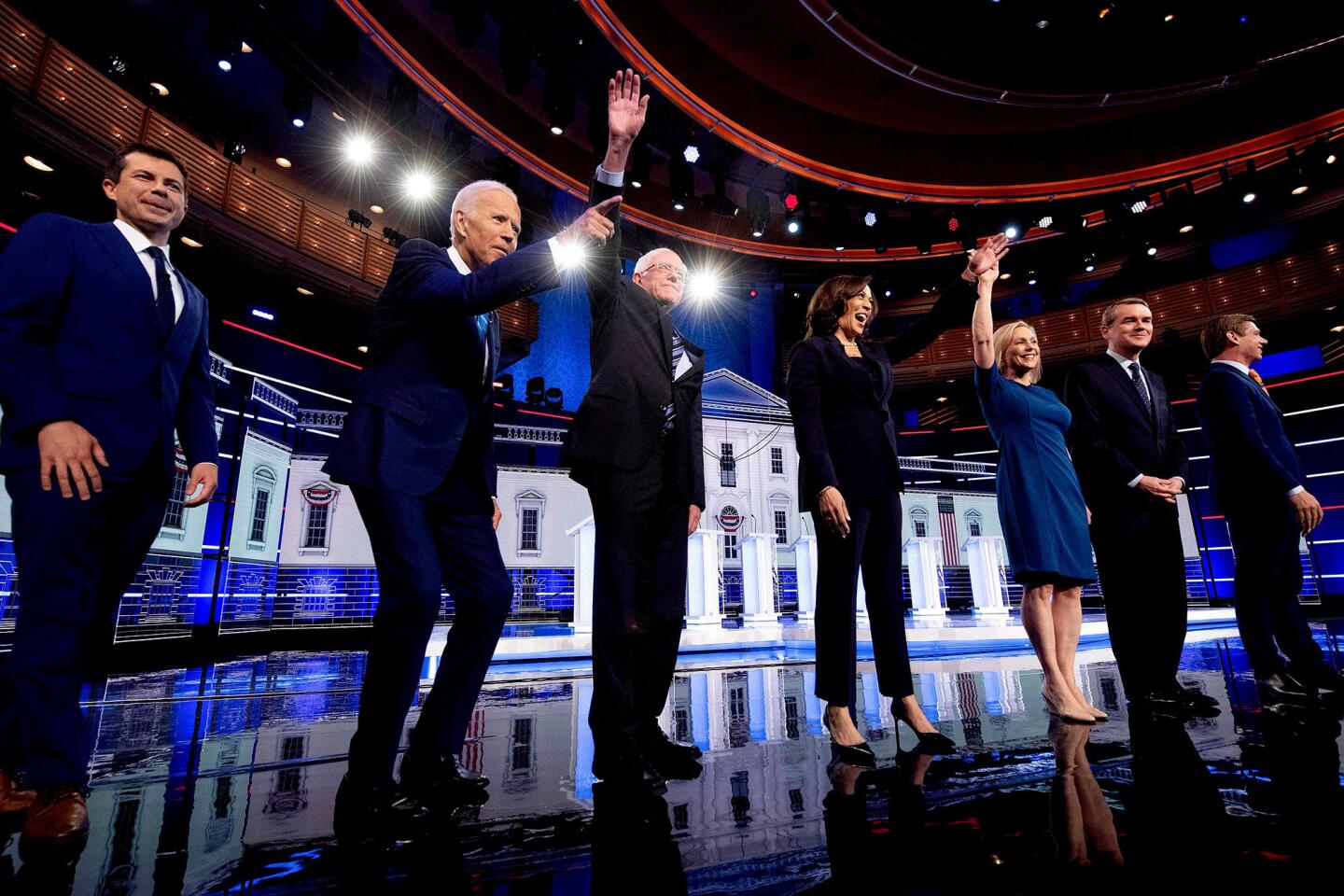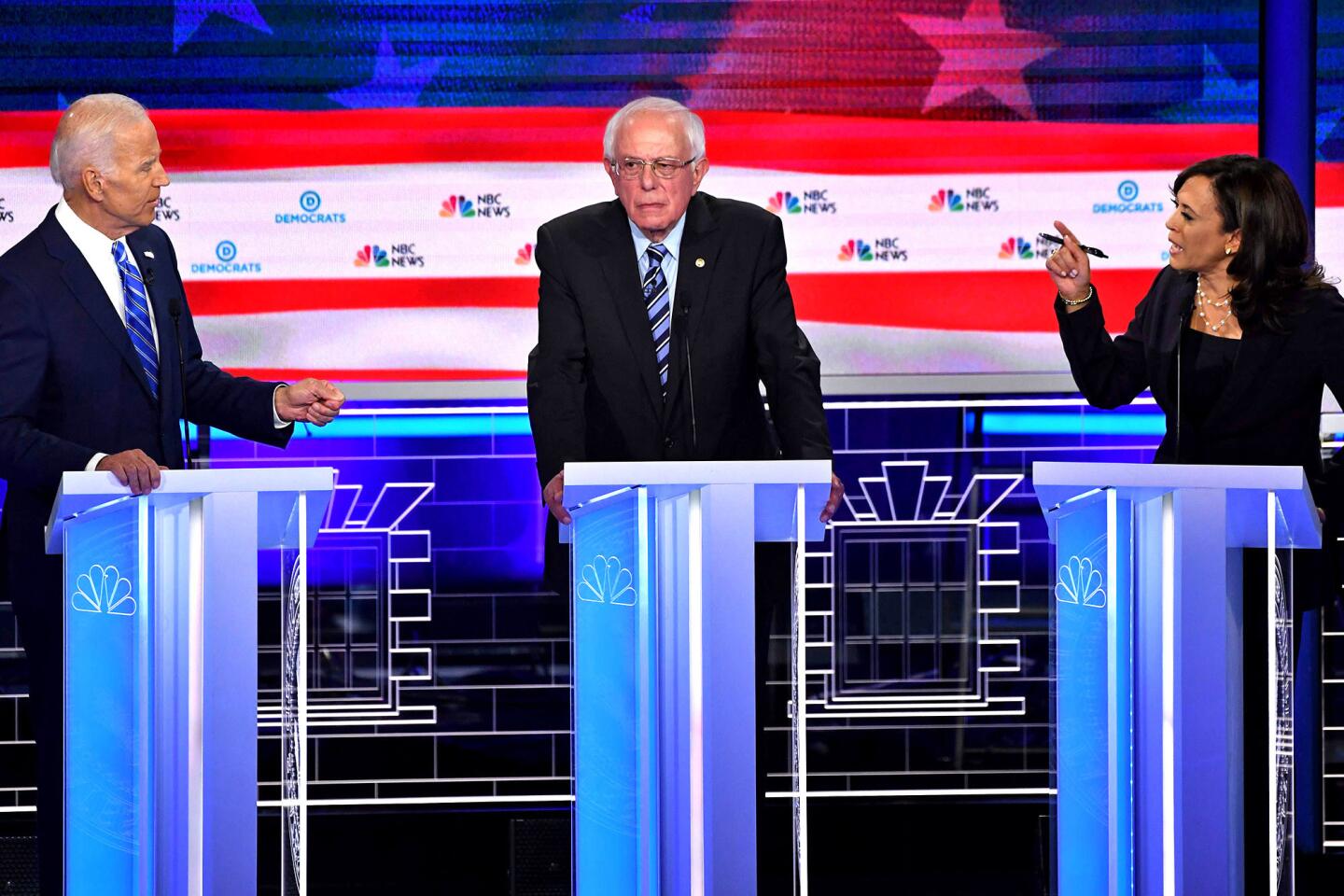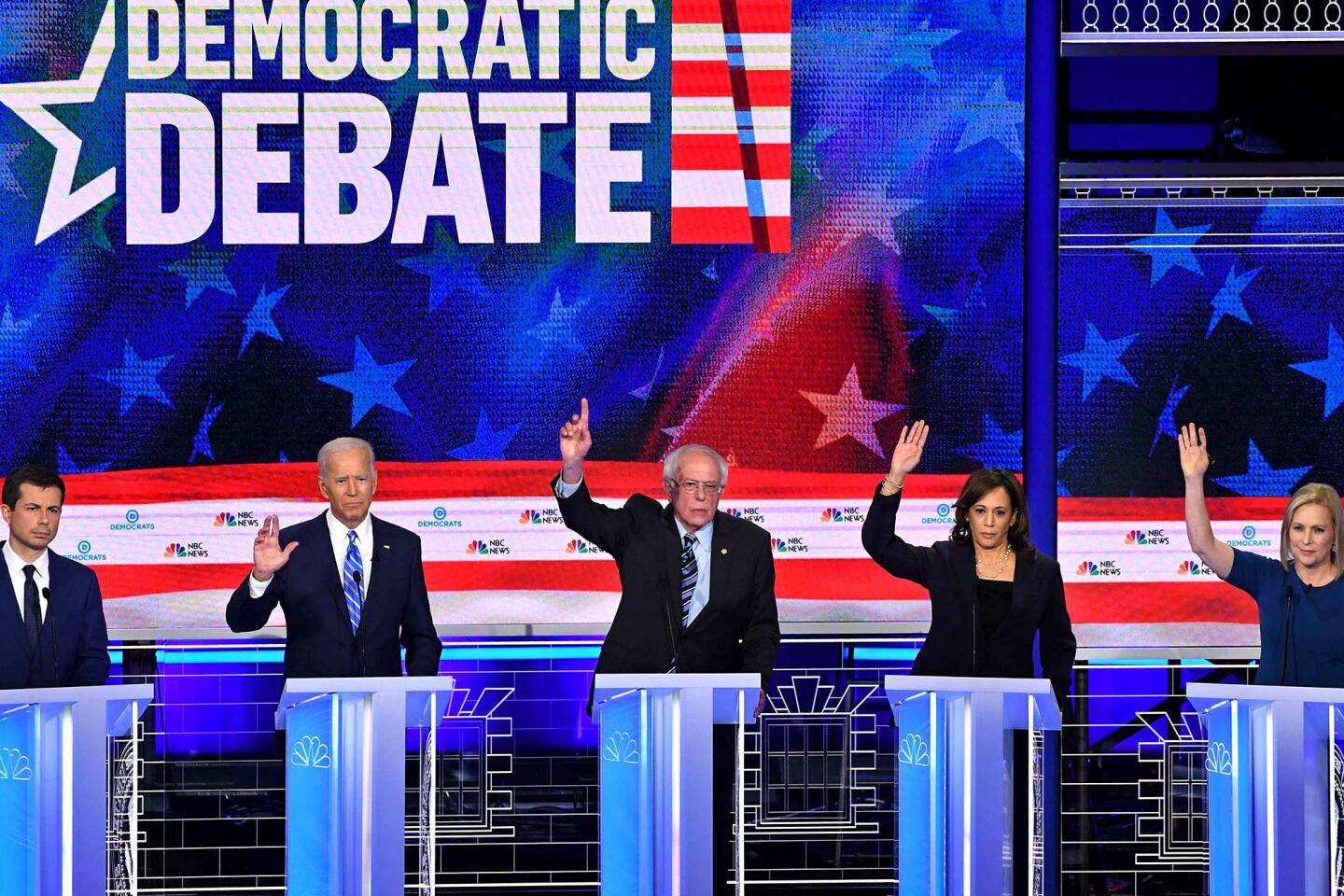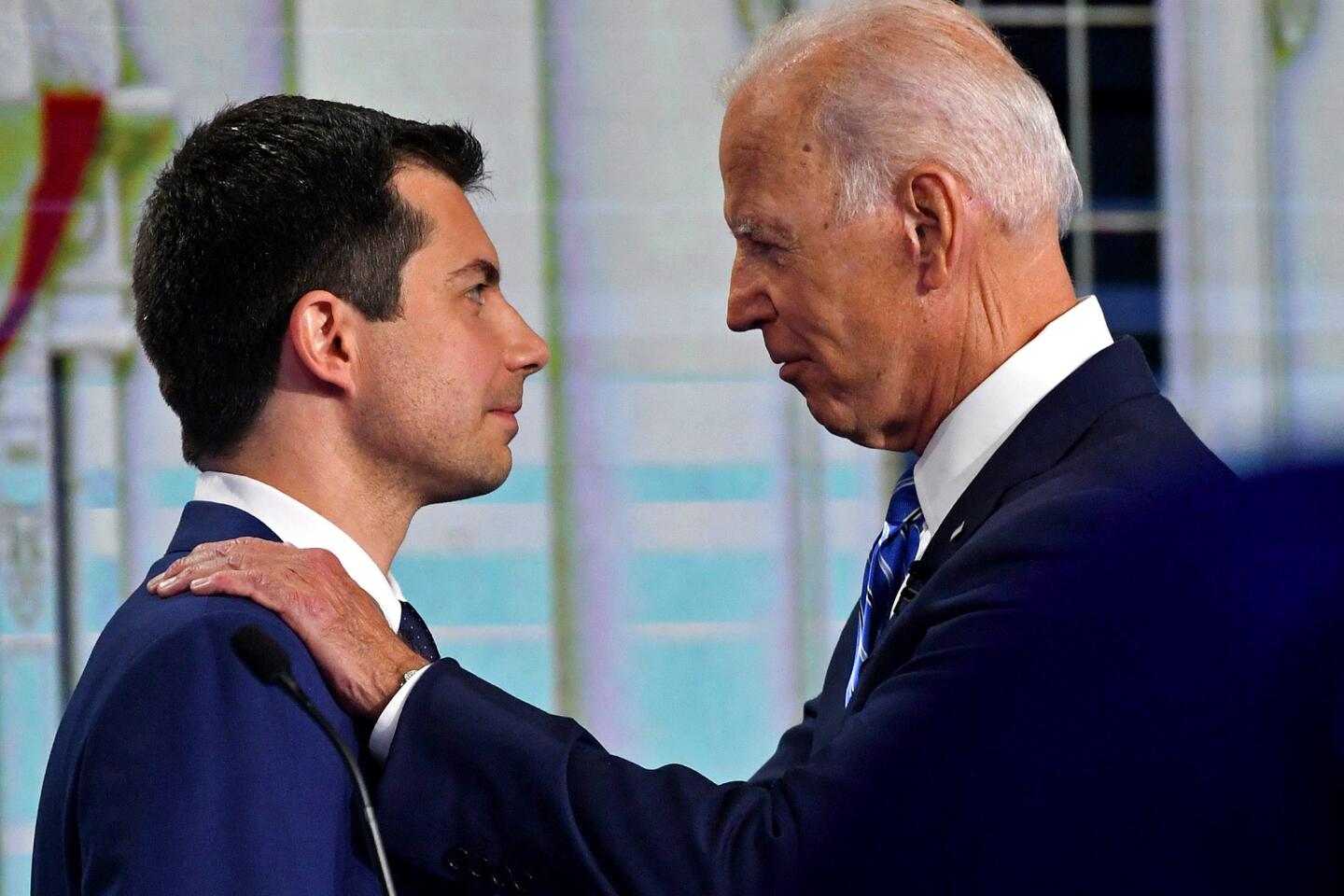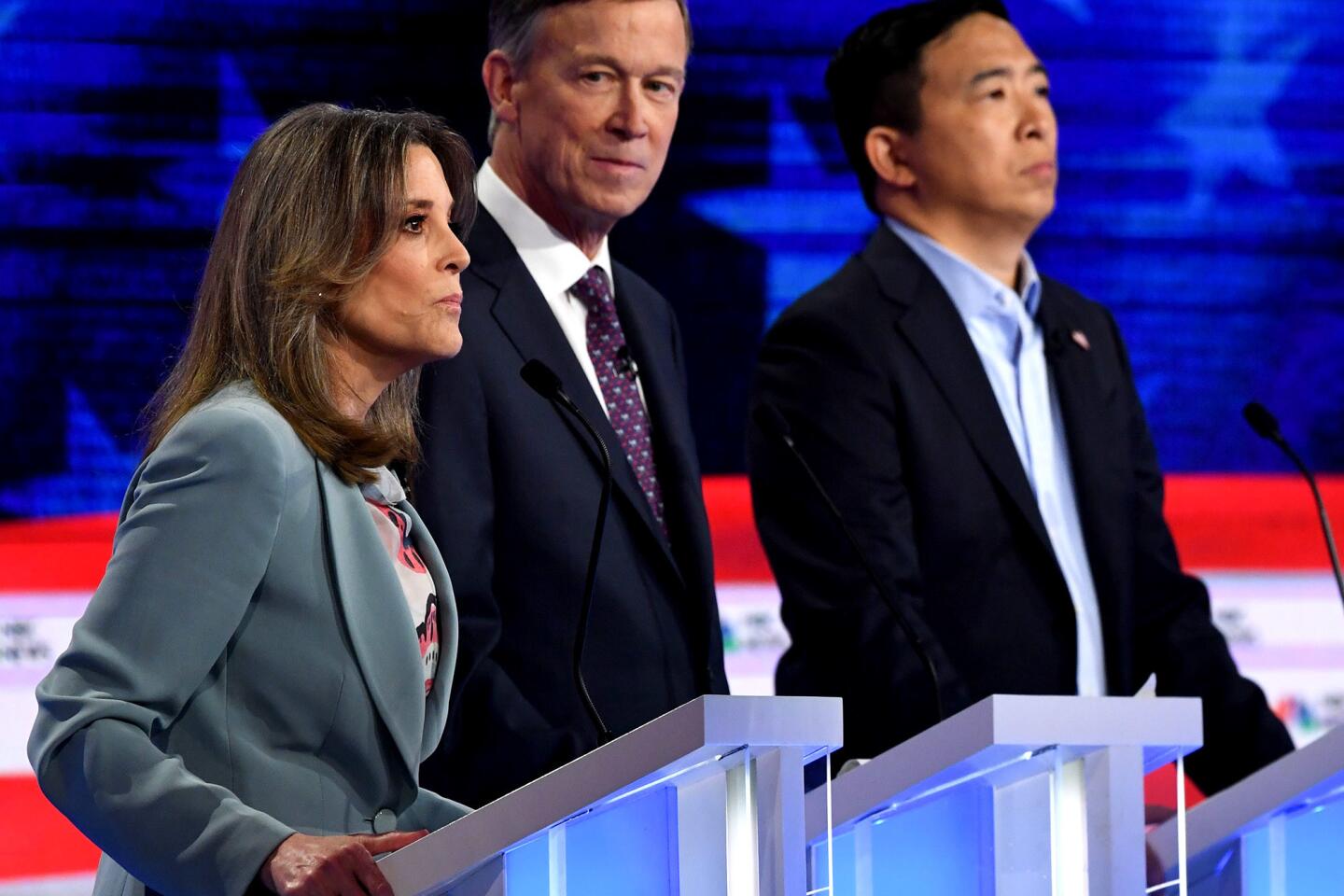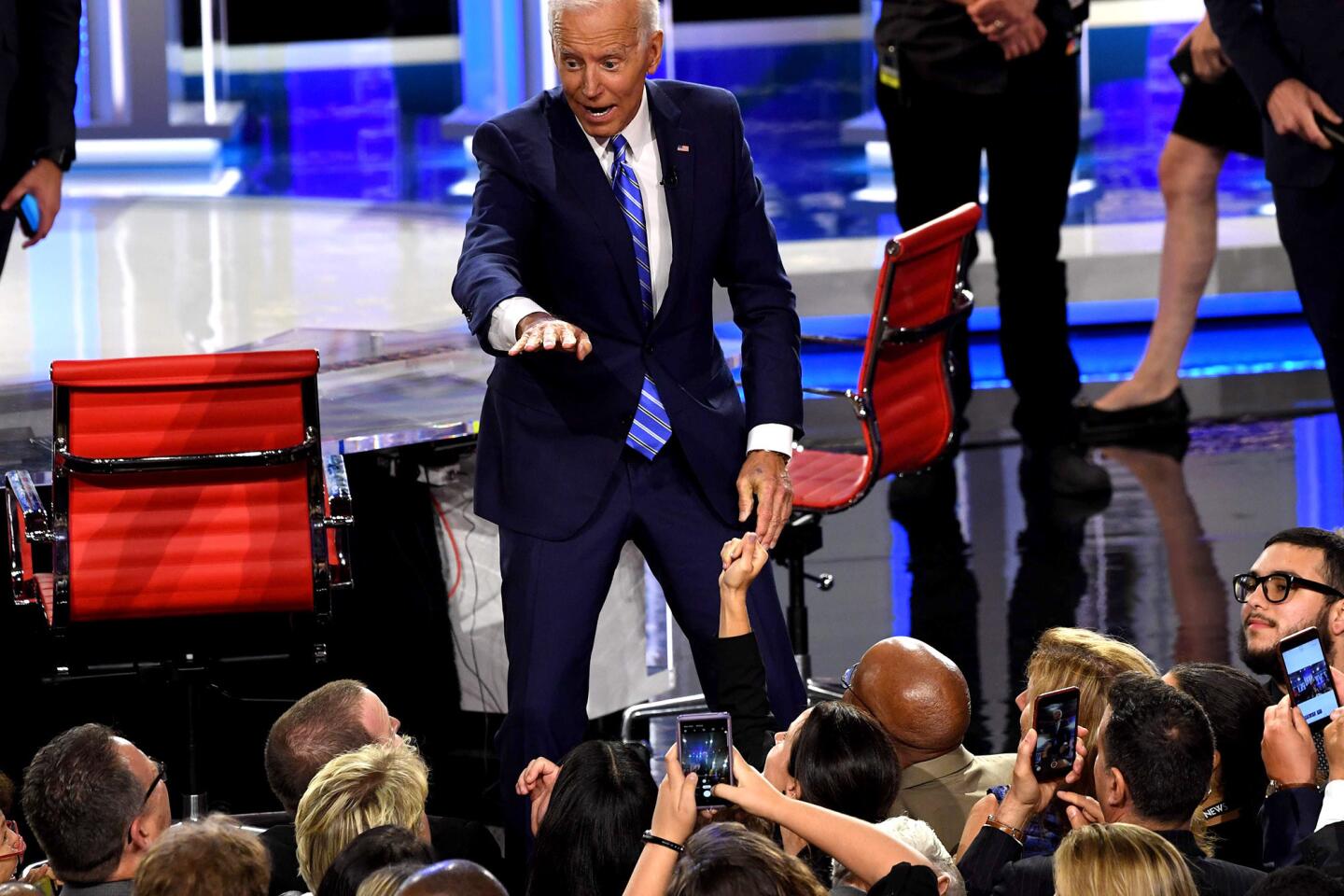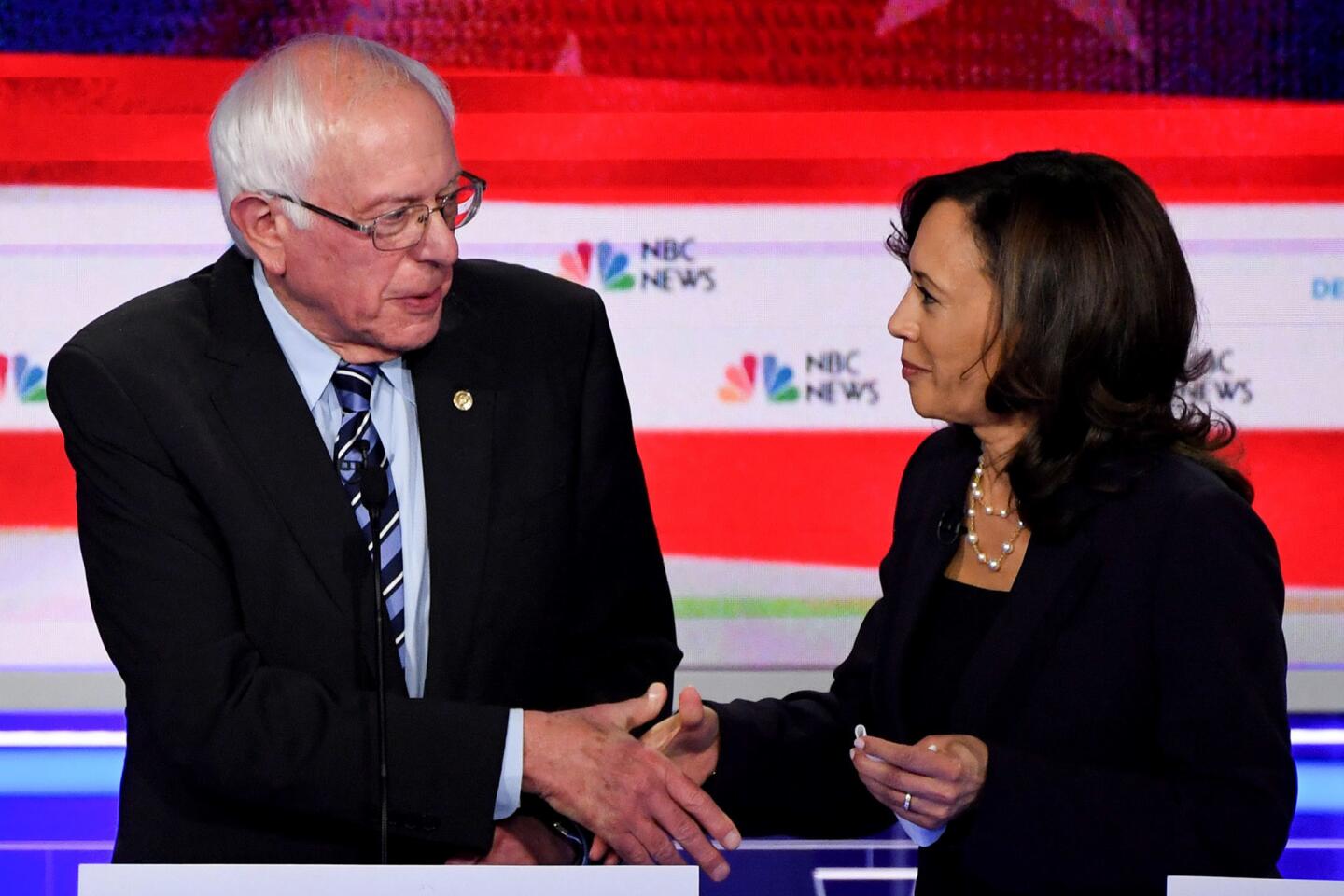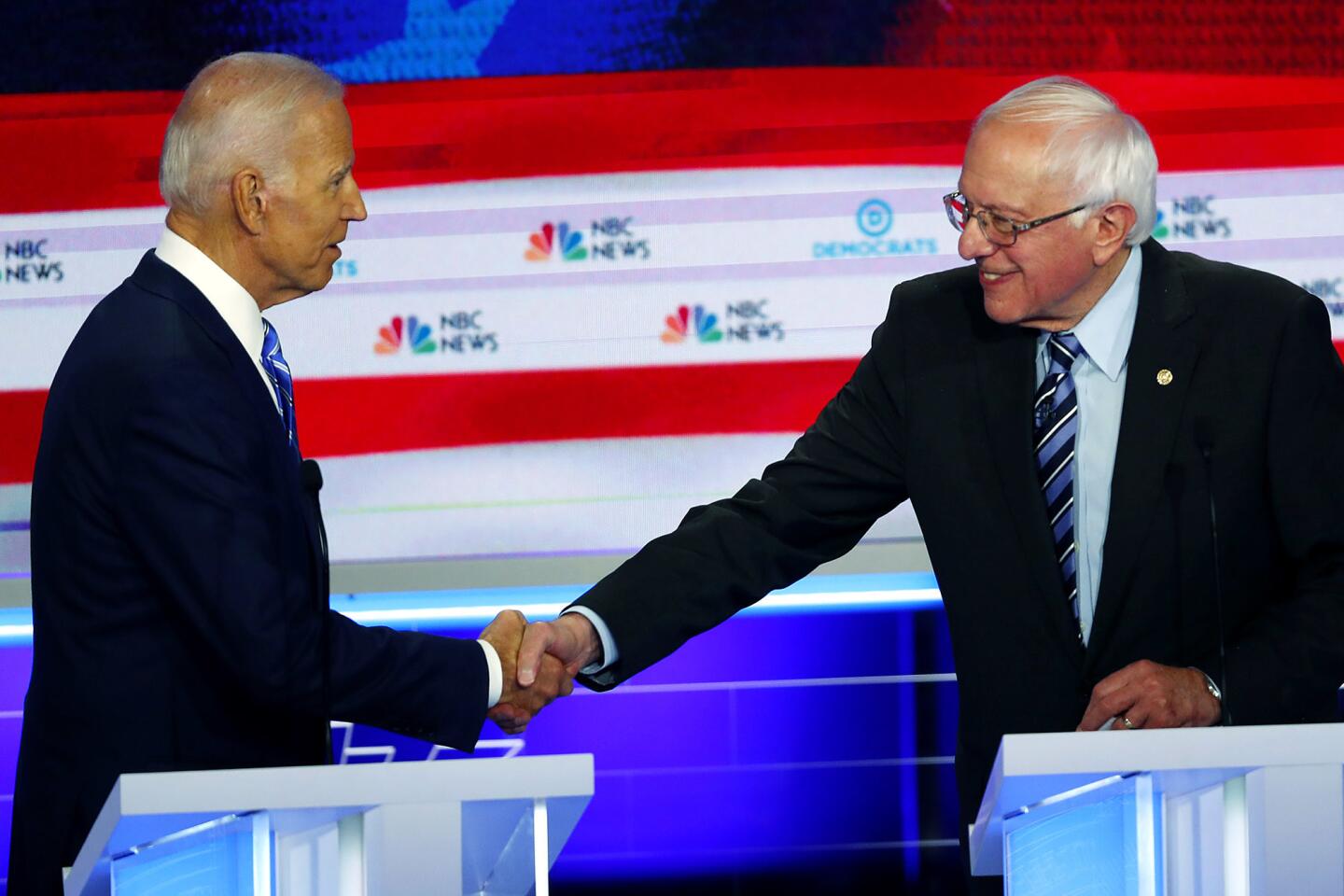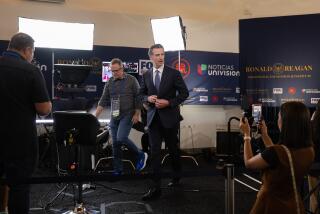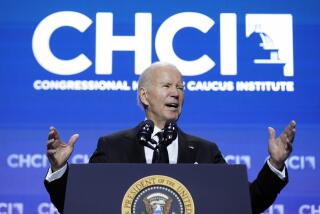Democratic debate: Joe Biden pushed on the defensive by Kamala Harris and others

California Sen. Kamala Harris has sharp words for former Vice President Joe Biden on the issue of busing during the debate Thursday.
Joe Biden, after months of trying to stay above the campaign fray, joined his 2020 rivals in debate Thursday and immediately faced challenges on issues of race, his relationship with Republicans, his support for the Iraq war and the need for generational change in the party.
The former vice president, who has been the front-runner in early polls, was thrown on the defensive by California Sen. Kamala Harris over recent remarks in which he sounded nostalgic about an era in the Senate when he could work civilly with segregationists.
In an intense flash of anger, Biden defended his record on civil rights, including his opposition in the 1970s to federally ordered school busing for desegregation — one of several occasions when he hunkered down to defend his record over 40 years in Washington and the reputation of the Obama administration.
“If you want to have this campaign litigated on who supports civil rights … I am ready to do that,” he said.
It was a dramatic, personal challenge that overshadowed the expected clash between Biden and Sen. Bernie Sanders of Vermont, the democratic socialist who is his ideological foil and is running second among Democratic primary voters in most polls.
It was the second of two evenings of debates on MSNBC, under rules set by the Democratic National Committee, marking the beginning of a new phase of the 2020 campaign that reached beyond the party’s most politically active members to a broader electorate.
The debate also exposed divisions among the 10 candidates onstage Thursday — over healthcare, immigration and what it will take to beat President Trump in 2020. It was something of a free-for-all of cross-talk and interruptions, as candidates — especially the lesser-known ones — struggled to be heard.
At one point, Harris interjected, “America does not want to witness a food fight. They want to know how we are going to put food on their table.”
The raucous debate may unsettle some of the dynamics of the race.
Harris’ confrontation with Biden was a signal moment for the senator, whose campaign had been stalled below the top tier in polling. She took the high-profile opportunity to stake out ground as a fresh and compelling voice on race — an issue Democrats continue to struggle with, at a time when African American voters will be crucial to the party’s success. And Harris, unafraid to confront Biden directly on this uncomfortable issue, was the only rival who truly knocked him off his game.
Sanders, by contrast, staked out no new ground, even as his chief rival for voters on the left wing of the party, Sen. Elizabeth Warren of Massachusetts, dominated the Wednesday debate.
Sanders offered his trademark call for dramatic change, including the expansion of Medicare for all Americans and free public college.
Eight takeaways from Night 1 of the Democratic debate »
“We have a new vision for America,” said Sanders. “We think it is time for change. Real change.”
He acknowledged he would impose higher taxes on the middle class but said that would be offset by the dramatically lower costs of healthcare. It was a statement that Republicans immediately seized on as ammunition.
“Bernie Sanders boasted that middle class Americans are going to have to pay more in taxes if his socialist policies are enacted,” Republican National Committee Chairwoman Ronna McDaniel said on Twitter. “The contrast could not be clearer - @realDonaldTrump cut taxes for the middle class, and Democrats want to tax middle class Americans into oblivion.”
Sanders made no apologies for his agenda, saying it would not doom the party’s chances to beat Trump.
“The last poll had us 10 points ahead of Donald Trump,” he said. “The American people understand Trump is a phony. Trump is a pathological liar and a racist.… That’s how we beat Trump. We expose him for the fraud that he is.”
Biden, who has espoused more incremental approaches to economic and health policy, did not directly engage Sanders on those issues and brushed off a question about his own comment at a recent fundraiser that the rich should not be demonized. He instead turned the focus to the president, as he has done throughout his campaign.
“Donald Trump thinks Wall Street built America,” he said. “Ordinary middle-class Americans built America.”
A big question going into the debate was whether Biden would hold onto his status as the clear front-runner, or suffer from the comparison to younger and more liberal candidates.
Some of his answers were tangled or off point. When asked specific questions, he often changed the subject. He was subdued until he came under attack by Harris and others, then he showed more passion — especially when defending the record of the Obama administration, a cornerstone of his campaign resume.
Rep. Eric Swalwell of Dublin, Calif., a long-shot candidate, took an early stab at challenging the 76-year-old Biden on the broadest ground that his time to lead has come and gone. “It’s time to pass the torch to a new generation of Americans,” said Swalwell, who is half Biden’s age and still saddled with student loan debt.
Biden refused to take the bait. “I’m holding onto that torch,” he said, then went on to talk about education.
Sanders also criticized Biden for his support for the Iraq war, which Sanders opposed.
Sen. Michael Bennet of Colorado, another long-shot candidate, criticized a major fiscal deal that Biden bragged of negotiating with Senate Majority Leader Mitch McConnell of Kentucky.
Night 1 of the debate: Candidates tackle immigration, taxes and climate change »
Bennet called the deal “a complete victory for the tea party” because it allowed most of the Bush-era tax cuts to be extended.
“That was a great deal for Mitch McConnell,” Bennet said. “It was a terrible deal for America.”
But no line of debate drew more heat and emotion than when the subject turned to race relations. Harris, one of three black candidates in the race, criticized Biden for recent comments about working with segregationist senators and his record decades ago of pushing through a compromise on school busing.
“There was a little girl in California who was part of the second class to integrate her public schools, and she was bused to school every day. And that little girl was me,” she said, reflecting on her experience being part of a class that integrated an elementary school in Berkeley. She said a bill Biden championed undermined such progress in civil rights.
Biden responded angrily, saying, “It is a mischaracterization of my position across the board.” He reflected on his career as a public defender and his work with President Obama, the nation’s first black president, to advance civil rights.
Harris pushed back: “Do you agree today you were wrong to oppose busing in America?” He responded that it was just federally ordered busing he opposed, but Harris said that was unacceptable.
“There are moments in history where states fail to preserve the civil rights of all people,” she said.
Subscribe to the Los Angeles Times 2020 election calendar »
The back-and-forth on race had started with a question for Pete Buttigieg, mayor of South Bend, Ind., who has been struggling with his own controversy after a white police officer in his city recently shot and killed an African American man. Buttigieg’s response to the incident has been attacked by the African American community, which accuses him of not holding the police accountable, and the police, who accuse him of rushing to judgment.
“I can walk you through all the things I have done. But nothing I say will bring him back,” he said of the man killed. “Until we move policing out from the shadow of systemic racism, we will be left with the problem that there is a wall of mistrust.
While the voices of the party’s progressives spoke most clearly in Wednesday’s debate, Thursday’s event brought into starker relief deep divisions within the party over how to reform the healthcare system, even as many of the candidates tout the same slogan: “Medicare for all.”
Biden spoke forcefully about the need to build on, not scrap, Obamacare. He rejected the idea, popular among progressives, that the nation should end private insurance and move to a single-payer system.
Sanders retorted: “The function of the healthcare system today is to make billions in profits for the insurance companies.”
Buttigieg struck a middle ground, proposing a system of “Medicare for all who want it.”
“For our primary care, we can’t be relying on the tender mercies of the corporate system,” he said.
The candidates were asked whether their healthcare plans would cover immigrants in the country illegally, and all raised their hands. It was a moment that President Trump relished from halfway around the globe.
Trump, who was in a series of meetings with world leaders on the sidelines of the Group of 20 summit in Osaka, Japan, claimed to have “just passed a television set” on his way to meet with German Chancellor Angela Merkel. He told reporters allowed into that meeting briefly that he “saw that maximum healthcare was given to 100% of the illegal immigrants coming into our country by the Democrats.”
Hook reported from Washington and Halper from Miami. Times staff writers Michael Finnegan and Eli Stokols contributed from Los Angeles and Osaka, Japan, respectively.
More to Read
Get the L.A. Times Politics newsletter
Deeply reported insights into legislation, politics and policy from Sacramento, Washington and beyond. In your inbox three times per week.
You may occasionally receive promotional content from the Los Angeles Times.
